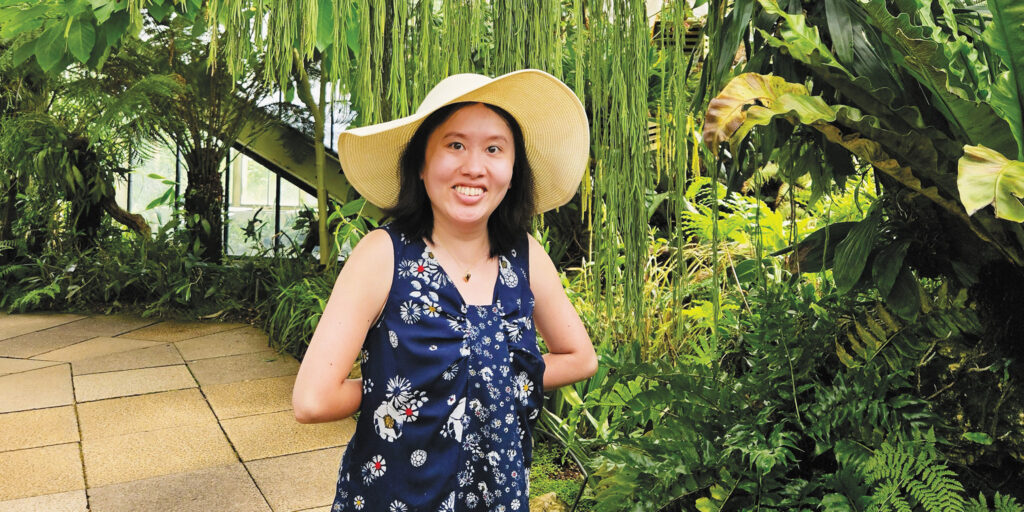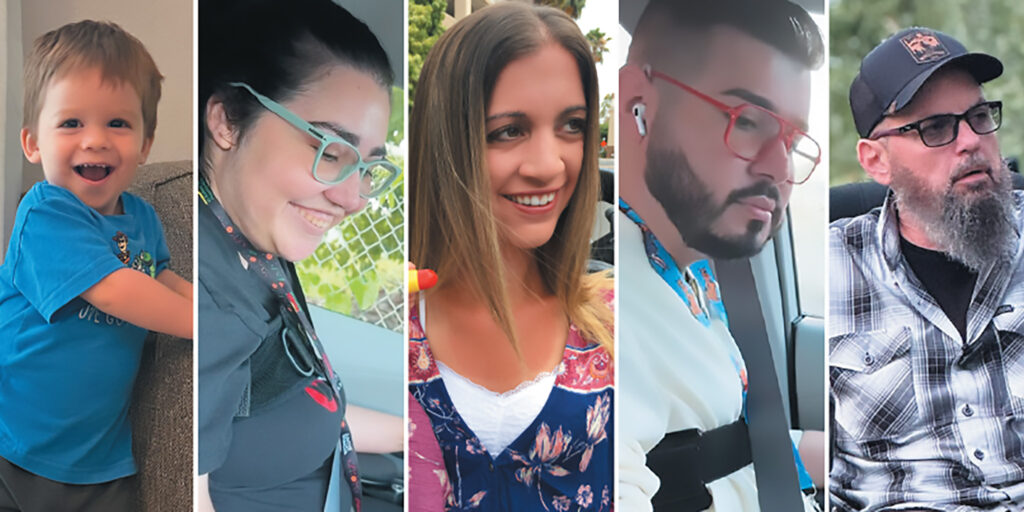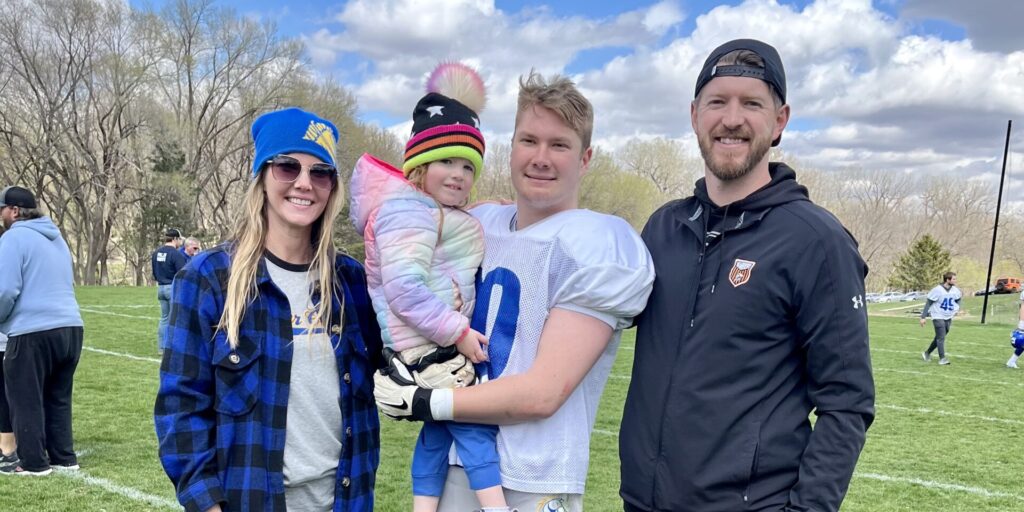
Former Collegiate Athlete Shares How to Stay Positive When Plans Change
By Rebecca Hume | Monday, May 20, 2024
To say that life does not always go as planned is an understatement. Unexpected changes during life’s journey often require individuals to make difficult decisions, sacrifices, and adjustments. And due to the progressive nature of most neuromuscular diseases (NMD), this is especially true for those living with an NMD diagnosis. Jayston Paulson, a former collegiate-level football player living with Lambert-Eaton Myasthenic Syndrome (LEMS), knows that learning to adjust, adapt, accept – and even embrace – new paths and passions when plans change is critical for maintaining mental health and over-all happiness. The 20-year-old put these skills to test when he made the difficult decision to play his final game of football this year, hanging his helmet and retiring at the end of his sophomore season.
For the love of the game
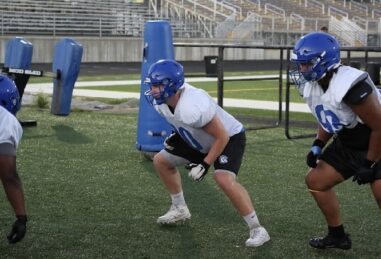
Jayston Paulson at football practice.
Jayston has been playing football for as long as he can remember. From his early days in youth Pee-Wee league until his last moments on the field at Briar Cliff University, Jayston’s love for the sport has always been an enormous part of who he is – but his journey with football has not always been a straight line.
As a multi-sport athlete, Jayston also participated in track and field as a short distance runner during the football off-season. When he was 15 years old, he noticed that he wasn’t performing as well on the track as he had the previous year. He began experiencing increased fatigue at a faster rate, often felt worn-out, after practice, and was increasingly sore and exhausted the next day. Jayston and his family brought their concerns to his doctor. Within a year, Jayston received a diagnosis of LEMS, began receiving care at the Mayo Clinic, and connected with MDA for support and resources. During that time, he took a hiatus from sports, including football, and was uncertain if he would ever be able to return to the field.
Jayston spent his freshman year of high school seeking a diagnosis and then working with his coaches and athletic trainers to understand his limitations and rebuild his abilities. “At that time, I had lost a lot of muscle and weight. It was hard for me to even walk at all,” Jayston says. “I worked hard to get stronger by working out and getting on the treadmill, rebuilding my endurance and stamina so that I wouldn’t fatigue as quickly.” Jayston worked with his coaches to mitigate symptoms by changing the way that he trained, and to counter his muscle loss by focusing on increasing his strength. He changed his training schedule to take full days off between training to prevent exasperation of his symptoms and allow time for rest while experiencing fatigue, muscle weakness, and soreness. He collaborated with his doctors to track his progress and activities, completing routine strength tests, paying close attention to his body, and ensuring that his training was medically safe.
With an increased understanding of his diagnosis and an on-going dedication to managing his symptoms, Jayston was able to take the field again as a defensive lineman for his sophomore year of high school and continued to shine on the field junior and senior year. “After I was diagnosed, I had a different outlook on football,” he says. “I was just happy to be able to be out there and to be competing with my friends. It brought me great joy to be able to play with my team again, because during the search for my diagnosis I wasn’t sure if I would ever be able to again. I had immense gratitude for being able to play the game.” That gratitude continued and expanded when he was offered an athletic scholarship to play college football at Briar Cliff University.
College ball, career aspirations, and changing paths
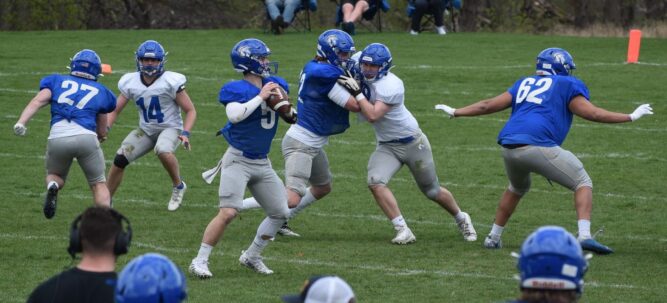
Jayston in action on the football field at Briar Cliff University.
In the fall of 2022, Jayston embarked on a new adventure: playing college football and pursuing a degree in business administration with a minor in agriculture. In addition to his love for sports, Jayston is passionate about farming and agriculture, with dreams one day to own his own small farm. With the support of his parents and his three-year-old sister (and biggest fan), Alba, he worked hard to balance academics, football, and his part-time job at a local cattle farm while navigating the symptoms of his disease. Jayston scheduled his classes for three days each week to maintain energy and prevent exhaustion. While working on the farm, he could complete most of his responsibilities by driving a tractor and allowing his muscles to rest. He was up-front with his coaches about his diagnosis and his needs during the recruitment process and shares that his coaches have been supportive and understanding when he has needed a break from practice or training.
“I told the coach about my diagnosis right away while I was being recruited. He was willing to work with me and give me a chance,” Jayston says. “I communicated with them very well when I was sick or needed to miss practice or weights. I shared my situation with the other players as well, and they have been very supportive and understanding.”
Even with the balance and support, playing college football brought new challenges to Jayston’s health and abilities. His freshman year, he started to get sick frequently, had a hard time recovering from practice and workouts, and could feel the game taking a toll on his body. “At the college level, everything felt like it got bumped up and intensified, because every day I was competing with the best of the best,” he says. “I was pushing myself so hard to just keep up with everyone else. When things got even harder sophomore year, I thought that it might be time to stop playing before I caused permanent damage or had negative long-lasting effects.”
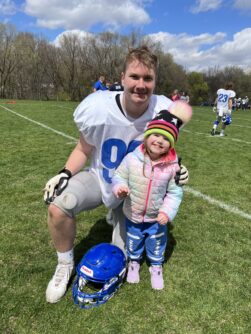
Jayston with his little sister and biggest fan, Alba.
Jayston spoke with his family and doctors about his concerns. He questioned if putting his body through the rigorous training was worth it in the long run and was concerned about possibly damaging his muscles or sustaining an injury. Living with a muscle disease, the recovery process for a torn or damaged muscle could look different than with healthier muscle tissue. He was concerned that lasting damage could also negatively impact his ability to pursue his career aspirations. Despite his love for football and his appreciation for the opportunity to play, he felt that it was time to make the difficult decision to step off the field.
“I had been thinking about it for a few months, so I had time to ponder back and forth. Once I made the decision, I was pretty mentally set on what I needed to do,” he says. “Because it got to the point where the game almost wasn’t enjoyable to me anymore because I was getting sick so often and was constantly feeling run down. Every day I would try to continue to compete – it just wasn’t fun anymore. I was ready to step away.”
Closing one door and opening another
Making difficult decisions, especially ones that include losing or leaving something that once brought joy, can take a toll on emotional and mental well-being. While Jayston’s decision to stop playing football served his physical well-being, his mindset and view on life have done well to serve his mental well-being as he adjusts to a life without football.
“Each day, I focus on that day and try to make the best of that day. With football, that was the hand that I was dealt, and I made the best of it for as long as I could,” he says. “An attitude of gratitude made it easier to stop playing because I am grateful for all of the years that I was able to play. I look back on it and smile, and now I have closed that chapter and am ready to move on to other things. Sometimes closing a chapter and moving on is the heathiest thing – once you close one door, open another one and pour joy into other areas.”
He shares that a key component to maintaining mental health when it comes to accepting that sometimes life’s path might end up looking a little different than planned is to trust the process and stay hopeful for the future. He advises others to find outlets and ways to decompress and have fun, especially when making difficult decisions. “Use things you enjoy to help clear your head and decompress – then come back to the decision,” he says. “You might realize that there is another door or pathway that you can take that is going to bring you joy.”
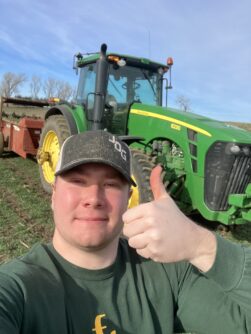
Jayston at work on the farm.
While Jayston enjoys gathering with his former teammates to reminisce about the fun that they had at practices and games over the years, he has poured his focus into other areas of his life. He finds great joy in his job, as he continues to feed a strong passion for farming that began to form in his heart when he was a small child riding his grandfather’s tractor. He enjoys spending time with his friends and family, serving as an MDA Ambassador, playing video games, and watching sports. And he especially loves spending time with his favorite sidekick and best bud, Alba.
In addition to enjoying each day as it comes, Jayston is excited to be looking towards the future. He plans to graduate in 2026, pursue a career in agriculture, and eventually purchase a few acres of his own to farm on the side. While his decision to stop playing football was a challenging choice that at first felt like a sacrifice, it ultimately opened the door to continue to pursue his career and other interests without limitations.
“I’ve learned that there are always plenty of other doors down the line,” Jayston says. And he hopes that others can view change in this light as well. “Some people don’t realize in the moment that there is a door right in front of them. It’s almost an invisible path that is right there. They just need to take that step and realize that there are always other options and other ways to find happiness and fulfillment.”
Next Steps and Useful Resources
- Read Quest Guest Ambassador Blog: Focusing on Mental Health
- To learn more about MDA’s Mental Health Hub, visit here.
- Stay up-to-date on Quest content! Subscribe to Quest Magazine and Newsletter.
Disclaimer: No content on this site should ever be used as a substitute for direct medical advice from your doctor or other qualified clinician.



